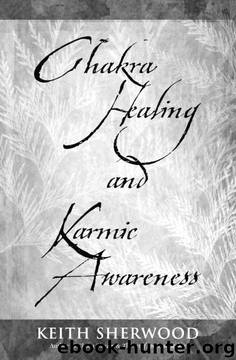Chakra Healing and Karmic Awareness by Keith Sherwood

Author:Keith Sherwood [Sherwood, Keith]
Language: eng
Format: epub
Published: 2010-03-15T04:26:00+00:00
Development of the Individual Mind
The individual mind and ego develop independently on each world and dimension. Unlike the higher and lower mind and their functions and aspects, however, neither the individual mind nor ego are stable entities, since they continually expand and contract as qualified subfields are added or removed, and attachment to them increases or decreases.
Although the process of accumulating karma remains dormant between lifetimes, even in the period between conception and birth karmic baggage can be added to the unborn child in the form of vasanas, bumpy strings, and personas. Indeed, because this process is a continuous one, there isn't a moment when the individual mind and ego are formed or created-rather, they evolve as a person evolves and individuates from one lifetime to another.
Although additional karma can accumulate shortly after conception, it is only after birth, as a child evolves physically and psychically, that the individual mind and ego, after a period of dormancy, once again begin to develop. There are four distinct stages of development, which coincide with a child's physical growth and sexual development.
In the first stage, which begins at birth and lasts about six years, a child is protected to a large degree against the intrusion of qualified energy because the "I" (ego identity) is not fully developed and the externalization of awareness has not reached its full development.
As the child grows, however, there is a shift of attention toward the external world that coincides with the development of the "I" and greater identification with the individual mind and ego. What is inside and outside becomes clearly defined, and the ability to analyze, conceptualize, and view the world abstractly is developed to a greater degree. During the second stage many children become more aware of the legacy of past action, and the limitations imposed on them and their free range of activities (both internal and external) by karma, particularly samskaras. At the same time they begin to experience a more fixed personality and rigid orientation toward themselves and the external world.
It is during this period, as a function of ego development and attachment to people, objects, and energy fields, that a child becomes increasingly prone to intrusions of dense qualified energy, particularly from adults who exercise authority over them.
The third stage of development begins at puberty and extends through early adolescence. In this stage, hormones come into play, and the primary arena of growth and development is the physical-material body. Secondary sexual characteristics develop and there is an increase in sexual sensitivity, along with an increase in genital awareness.
It is at this stage-at least for the majority of children-that the individual mind and ego eclipse the functions of the higher and lower mind, and the "I", the focal point of the individual mind and ego, becomes dominant. As identification with the "I" becomes stronger, gender identification becomes more focused. Patterns of energy that distinguish men from women become more pronounced, with boys asserting energy forward from the second chakra and accepting or receiving energy by the heart chakra.
Download
This site does not store any files on its server. We only index and link to content provided by other sites. Please contact the content providers to delete copyright contents if any and email us, we'll remove relevant links or contents immediately.
| Confucianism | Feng Shui |
| I Ching | Jainism |
| Karma | Shintoism |
| Sikhism | Tao Te Ching |
| Taoism | Tibetan Book of the Dead |
| Zoroastrianism |
The Tao of Physics by Fritjof Capra(2276)
Human Design by Chetan Parkyn(2075)
The Diamond Cutter by Geshe Michael Roach(2062)
Feng Shui by Stephen Skinner(1941)
The Alchemy of Sexual Energy by Mantak Chia(1860)
Tao Te Ching by Lao Tzu(1843)
365 Tao: Daily Meditations by Ming-Dao Deng(1625)
Tao Tantric Arts for Women by Minke de Vos(1600)
Sun Tzu's The Art of War by Giles Lionel Minford John Tzu Sun(1542)
Sidney Sheldon (1982) Master Of The Game by Sidney Sheldon(1520)
Buddhism 101 by Arnie Kozak(1514)
Karma-Yoga and Bhakti-Yoga by Swami Vivekananda(1496)
The Analects of Confucius by Burton Watson(1436)
The Art of War Other Classics of Eastern Philosophy by Sun Tzu Lao-Tzu Confucius Mencius(1429)
Tao te ching by Lao Tzu(1367)
The Way of Chuang Tzu by Thomas Merton(1366)
The New Bohemians Handbook by Justina Blakeney(1356)
The Sayings Of by Confucius(1318)
Bless This House by Donna Henes(1272)
